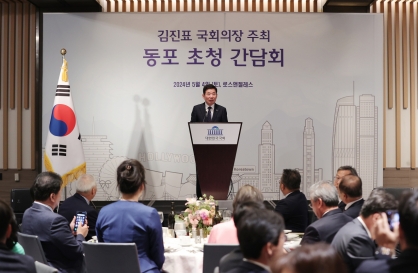Hong Kong pseudo-election denies will of the governed
By Korea HeraldPublished : March 28, 2012 - 10:35
Leung Chun-ying, a former adviser of the Hong Kong government and property consultant, was declared winner of the election as the Chinese city‘s next chief executive. He won 689 votes from a 1,200-member election committee composed mainly by pro-Beijing business leaders and other elites.
Given the circumstances, Leung ran a clever race. He first worked hard to build up public support by announcing policy proposals popular among the general public such as increasing social housing, despite the almost unquestioned advantage of his rival who was apparently Beijing’s first choice for the top, Henry Tang. Leung stood to gain after a series of scandals made the already unpopular Tang virtually unelectable and Beijing “advised” the election committee members to go along with the public choice, in effect replacing Tang with Leung as the heir apparent.
Despite being the candidate with the highest approval rating, Leung‘s election was not regarded by the Hong Kong people as a victory of public opinion. The third candidate and a pro-democracy politician Albert Ho described Leung as the worst looking winner in the race with low public approval, low elite support and low credibility. There are already talks of a major demonstration on July 1 to protest the “small circle” pseudo-election.
The reason behind this paradoxical opposition against the most popular candidate is simple. In a mock general poll to show ordinary Hong Kongers’ unhappiness with an election in which they have no say, around 55 percent of the 222,990 votes cast were blank in the poll conducted by Hong Kong University.
In other words, Leung may be better described as the less loathed of the two candidates who had the greatest chances of success. A considerable portion of the public would rather see the election fail than to see either Tang or Leung win.
The true achievement of the pseudo-election, in this sense, is to add resolve to the Hong Kong public to fight for their right to elect their chief executive as promised by China and to remind Beijing of the unfeasibility of a half-hearted election. The election described by the Financial Times as “the most rancorous, divisive and scandal-plagued leadership” in Hong Kong took place when Beijing desired stability most as the Communist Party gears up for its own leadership change.
The mudslinging and outright attacks between Tang and Leung during the election has the potential to hurt the Asian financial hub in the end. Tang‘s revelation that Leung suggested willingness to deploy riot police and tear gas in a closed-door meeting in 2003 to confront protesters opposed to controversial anti-subversion legislation has gravely damaged Leung’s public support and will mean trouble ahead for the chief executive-designate.
While Leung emphasised in a remark after his victory that he will consult widely on national security legislation, turbulence on the issue is likely in his five-year tenure, which will in turn damage Hong Kong‘s stability. Accusations of Leung meeting with an organised crime ring leader will also hurt Hong Kong’s image as a politically clean city.
The main problem is that this election came with all the negative effects of a democratic election but none of its strengths. Divisive and drama-prone as Taiwan‘s recent elections have been, the public mandate they represent helps direct the nation’s future and reminds politicians of the will of the public. Repeated errors and corrections also help Taiwan‘s democratic elections to gradually mature. It is not hard to criticise the 2012 presidential election but it was also admired by many, including people from mainland China. Without a public mandate, no winner of Hong Kong’s top election can honourably function in the long term.
Taiwan‘s Mainland Affairs Council expressed its expectations to deepen bilateral exchanges and cooperation with the new Hong Kong leader. The nation should go further and target Hong Kong as a key point in its strategy.
Editorial
The China Post (Taiwan)
(Asia News Network)
Given the circumstances, Leung ran a clever race. He first worked hard to build up public support by announcing policy proposals popular among the general public such as increasing social housing, despite the almost unquestioned advantage of his rival who was apparently Beijing’s first choice for the top, Henry Tang. Leung stood to gain after a series of scandals made the already unpopular Tang virtually unelectable and Beijing “advised” the election committee members to go along with the public choice, in effect replacing Tang with Leung as the heir apparent.
Despite being the candidate with the highest approval rating, Leung‘s election was not regarded by the Hong Kong people as a victory of public opinion. The third candidate and a pro-democracy politician Albert Ho described Leung as the worst looking winner in the race with low public approval, low elite support and low credibility. There are already talks of a major demonstration on July 1 to protest the “small circle” pseudo-election.
The reason behind this paradoxical opposition against the most popular candidate is simple. In a mock general poll to show ordinary Hong Kongers’ unhappiness with an election in which they have no say, around 55 percent of the 222,990 votes cast were blank in the poll conducted by Hong Kong University.
In other words, Leung may be better described as the less loathed of the two candidates who had the greatest chances of success. A considerable portion of the public would rather see the election fail than to see either Tang or Leung win.
The true achievement of the pseudo-election, in this sense, is to add resolve to the Hong Kong public to fight for their right to elect their chief executive as promised by China and to remind Beijing of the unfeasibility of a half-hearted election. The election described by the Financial Times as “the most rancorous, divisive and scandal-plagued leadership” in Hong Kong took place when Beijing desired stability most as the Communist Party gears up for its own leadership change.
The mudslinging and outright attacks between Tang and Leung during the election has the potential to hurt the Asian financial hub in the end. Tang‘s revelation that Leung suggested willingness to deploy riot police and tear gas in a closed-door meeting in 2003 to confront protesters opposed to controversial anti-subversion legislation has gravely damaged Leung’s public support and will mean trouble ahead for the chief executive-designate.
While Leung emphasised in a remark after his victory that he will consult widely on national security legislation, turbulence on the issue is likely in his five-year tenure, which will in turn damage Hong Kong‘s stability. Accusations of Leung meeting with an organised crime ring leader will also hurt Hong Kong’s image as a politically clean city.
The main problem is that this election came with all the negative effects of a democratic election but none of its strengths. Divisive and drama-prone as Taiwan‘s recent elections have been, the public mandate they represent helps direct the nation’s future and reminds politicians of the will of the public. Repeated errors and corrections also help Taiwan‘s democratic elections to gradually mature. It is not hard to criticise the 2012 presidential election but it was also admired by many, including people from mainland China. Without a public mandate, no winner of Hong Kong’s top election can honourably function in the long term.
Taiwan‘s Mainland Affairs Council expressed its expectations to deepen bilateral exchanges and cooperation with the new Hong Kong leader. The nation should go further and target Hong Kong as a key point in its strategy.
Editorial
The China Post (Taiwan)
(Asia News Network)
-
Articles by Korea Herald



![[AtoZ Korean Mind] Does your job define who you are? Should it?](http://res.heraldm.com/phpwas/restmb_idxmake.php?idx=644&simg=/content/image/2024/05/06/20240506050099_0.jpg&u=)















